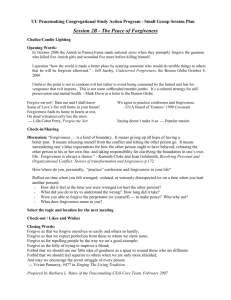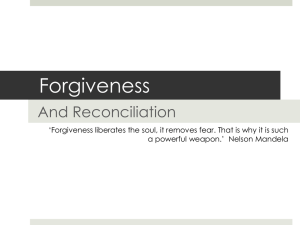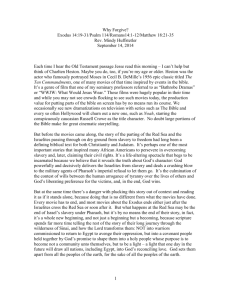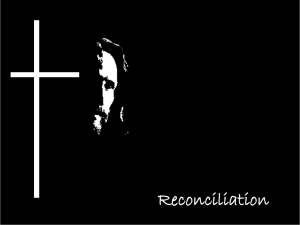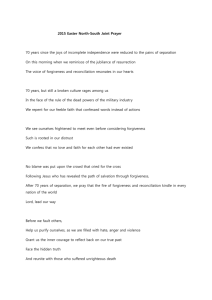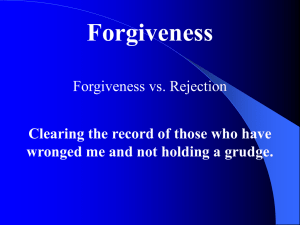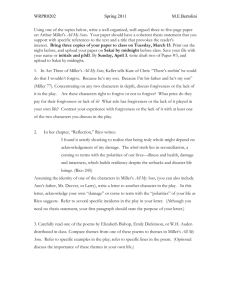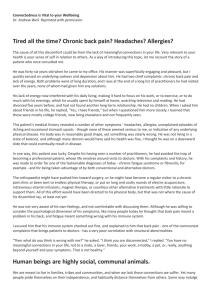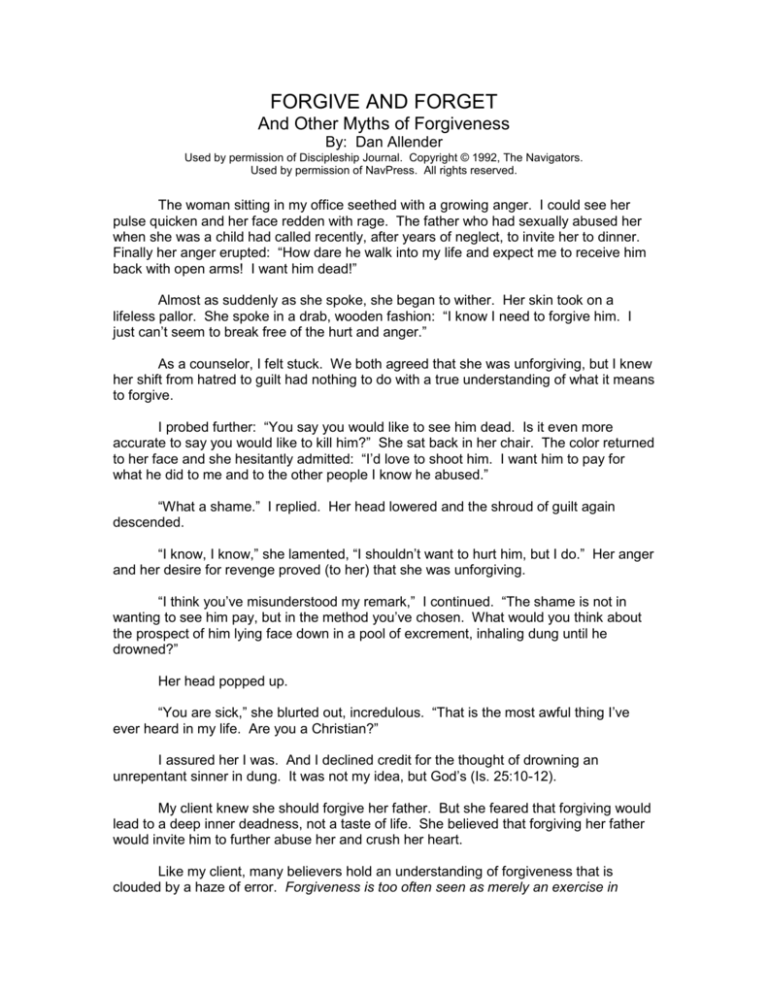
FORGIVE AND FORGET
And Other Myths of Forgiveness
By: Dan Allender
Used by permission of Discipleship Journal. Copyright © 1992, The Navigators.
Used by permission of NavPress. All rights reserved.
The woman sitting in my office seethed with a growing anger. I could see her
pulse quicken and her face redden with rage. The father who had sexually abused her
when she was a child had called recently, after years of neglect, to invite her to dinner.
Finally her anger erupted: “How dare he walk into my life and expect me to receive him
back with open arms! I want him dead!”
Almost as suddenly as she spoke, she began to wither. Her skin took on a
lifeless pallor. She spoke in a drab, wooden fashion: “I know I need to forgive him. I
just can’t seem to break free of the hurt and anger.”
As a counselor, I felt stuck. We both agreed that she was unforgiving, but I knew
her shift from hatred to guilt had nothing to do with a true understanding of what it means
to forgive.
I probed further: “You say you would like to see him dead. Is it even more
accurate to say you would like to kill him?” She sat back in her chair. The color returned
to her face and she hesitantly admitted: “I’d love to shoot him. I want him to pay for
what he did to me and to the other people I know he abused.”
“What a shame.” I replied. Her head lowered and the shroud of guilt again
descended.
“I know, I know,” she lamented, “I shouldn’t want to hurt him, but I do.” Her anger
and her desire for revenge proved (to her) that she was unforgiving.
“I think you’ve misunderstood my remark,” I continued. “The shame is not in
wanting to see him pay, but in the method you’ve chosen. What would you think about
the prospect of him lying face down in a pool of excrement, inhaling dung until he
drowned?”
Her head popped up.
“You are sick,” she blurted out, incredulous. “That is the most awful thing I’ve
ever heard in my life. Are you a Christian?”
I assured her I was. And I declined credit for the thought of drowning an
unrepentant sinner in dung. It was not my idea, but God’s (Is. 25:10-12).
My client knew she should forgive her father. But she feared that forgiving would
lead to a deep inner deadness, not a taste of life. She believed that forgiving her father
would invite him to further abuse her and crush her heart.
Like my client, many believers hold an understanding of forgiveness that is
clouded by a haze of error. Forgiveness is too often seen as merely an exercise in
releasing bad feelings and ignoring past harm, pretending all is well. Yet nothing could
be further from the truth. True forgiveness often deepens internal passion and sorrow.
Yet it is a powerful agent in a process that can transform both the forgiver and the
forgiven. It is a gift that pierces a hardened, defensive heart with rays of redemptive
kindness.
In this article we will look at the misunderstandings of forgiveness that rob
Christians of perspective, passion, and purpose. A follow-up article in the next issue will
explore what it means to forgive.
The Myth of Forgetting the Harm
A central misunderstanding that fuels many other myths about forgiveness is the
notion that we are to “forgive and forget.” The concept comes from two major passages:
Ps. 25:7 and Jer. 31:34. The psalmist asks God not to remember the sins of his youth
but instead to recall His mercy and love. In the Jeremiah passage God says: “I will
forgive their wickedness and will remember their sins no more.” Christians are told to be
like God, who does not remember sin but forgives wickedness.
This would be a good principle to follow were it not for one fact: God does
remember sin. We are told that one day we will all appear before God and receive our
rewards based on “the things done while in the body, whether good or bad” (2 Cor. 5:10)
God remembers sin and righteousness, and He uses the date to determine our due.
When the writers of Scripture say God has taken away our sins “as far as the
east is from the west” (Ps. 103:12) and will “hurl all our iniquities into the depths of the
sea” (Mic. 7:19), they are using metaphors, not making statements of fact about God’s
loss of memory. A metaphor is like an impressionistic painting. It is overstated and
dramatic; full of life, but not intended to be taken as a precise, literal representation of
the scene painted. Imagine how absurd it would be if someone wanted to discover the
actual place where the east is divided from the west. In the same way, it is absurd to
take the metaphor of God’s forgetfulness and make it into a tangible requirement of
forgiveness.
When we try to forget the wrongs we have suffered, we lose our perspective on
our personal history. In many cases, we are trying to create a less distressing and
disappointing past. Because we are terrified that we cannot face the past without being
overwhelmed by pain, we never taste the wonder of God’s forgiveness – both for our
own sin and for the sins of those who have harmed us.
The effort to erase the past fuels a spirit of independence and denial. I spoke to
one man who seemed enormously proud of the fact that he had risen above his alcoholic
father and promiscuous mother. I asked him if he ever felt overwhelmed by the sadness
of his family history. He responded: “I’ve forgiven them. I don’t look behind me. I just
press on like Paul to the goal of godliness.”
Forgiveness, for him, meant cutting the losses, ignoring the pain of the past, and
keeping busy enough to outpace the sadness. Yet this kind of detachment dulls the
senses and distorts perspective. His zeal to forget blinded him to the baggage he
carried from the past and strengthened his determination to remain emotionally distant,
stiff, and dogmatic. His family paid a terrible price for his “forgetting.”
The Myth of Releasing Anger
For most believers, the proof of forgiveness is an absence of anger. It is
assumed that if you still feel a stab of betrayal when you see the friend who told lies
about you, then you’ve not forgiven him. If you still seethe when you remember how
someone used you for his own wicked pleasure, then you’ve not forgiven him. The proof
is in the emotional pudding – strong emotions are evidence that you have failed to
forgive.
Many attempt to put their injuries behind them through a dramatic, climactic,
once-and-for-all deliverance from anger. They assume that forgiving involves a sudden,
marked change from being filled with bitterness and hatred to a state of untroubled
peace. Those who hold this view refer to forgiveness as a finished event (“It took years
before I forgave my father”) rather than an ongoing work of the Spirit of God.
Some people do experience one climactic moment when a transition from
bitterness to forgiveness takes place. The problem comes when they assume the
struggle to forgive is over and the tumultuous feelings resolved. It is naïve to believe
that forgiving another for any one failure or for a lifetime of harm is ever entirely finished.
In truth, the more fully we face the harm we have suffered, the more deeply we must
forgive. Forgiving another is an ongoing process, rather than a once-and-for-all event.
The “once forgiven, always forgiven” approach often leads to enormous pressure
to keep bad feelings at bay. One woman told me that she held a grudge against her
husband for nearly a year after she discovered he was having an affair. During an
emotional church service, she responded to the pastor’s invitation to come forward and
leave any anger or bitterness at the altar. In a moment of cleansing absolution, she
poured her heart out before the Lord, asking for forgiveness for her hardened heart. She
wept. She felt released.
A week later, she told me that she no longer felt angry at her husband, nor
experienced pangs of hurt every time he approached her sexually. I rejoiced with her
but I felt a tinge of doubt when she claimed to be entirely free of anger. Sure enough
several weeks after the release of her bitterness, she saw her husband talking to
another woman at church. The woman stood close to him and stroked his arm with an
intimate familiarity. She was furious, but she handled her anger by chastising herself for
being so suspicious. She questioned how she could forgive and then succumb to anger
so quickly. “What have I failed to do?” she asked.
Anger or hurt is often understood to be contrary to forgiveness. Yet listen to the
heart of God:
“Is not Ephraim my dear son, the child
in whom I delight? Though I often speak
against him, I still remember him. Therefore
my heart yearns for him; I have great compassion
for him.”
Jer. 31:20
Sin hurts God, and it draws forth His passionate response. God spoke of His
hurt and anger over the sin of His children in deeply personal terms. The natural
response to deep personal pain is to deaden one’s heart to the sorrow. Instead, God
says He will remember him, no matter how deep the anguish.
God is active and angry. Hurt and anger are not the final proof of a lack of
forgiveness. In fact, an absence of strong feelings implies a lack of heart involvement.
When bitterness is released there seems to be a propensity to toss a holy anger
out with the dirty bath water. Anger can be full of sinful demands. But in other cases,
anger is a loving response to someone who has violated the beauty of God’s glory and
the humanness of others. Anger can reflect a passion that desires to destroy the
cancerous arrogance that will eventually spa beauty and life from the offender’s soul.
If we forsake holy anger – the passionate desire to destroy that which
compromises what God intended – we are apt to detach ourselves from the battle and
think that we are actually releasing an unforgiving spirit. We will be less likely to deal
with the log in our own eye or the speck in the eye of the one who hurt us.
We must retain a zeal for righteousness and a hatred for sin as we live in a world
that tears at our integrity and wearies the strongest of pilgrims.
The Myth of Not Desiring Revenge
Most people assume revenge is bad; that the desire for revenge is a base,
primitive emotion that has no place in Christian society. The client I mentioned in the
beginning of this article viewed her desire to make her father pay as proof of her
unforgiving spirit.
Unfortunately, we are all apt to dress the concept of forgiveness in garments that
are too refined and delicate to handle the battle of life. When I suggested that she allow
herself to savor the thought of the punishment God would ultimately deliver her father,
she was stunned and aghast. Many Christians view the desire for revenge to be
incompatible with love and forgiveness. Revenge seems to be derived from an ugly,
bitter heart. Is that necessarily the case?
Revenge involves a desire for justice. It is the intense wish to see ugliness
destroyed, wrongs righted, and God’s glory restored. Anyone who strays outside the
parameters of love and acts to destroy God’s order is a weed that might diminish the
beauty or destroy the fruitfulness of His “garden.” Consequently, vengeance is merely
the pulling of the weed to keep the garden lovely and fruitful. A commitment to God’s
glory is the heartbeat of true biblical revenge.
A true and deep hunger for vengeance energizes our commitment to destroy sin
– both in ourselves and in other. Godly vengeance is not vindictive punishment taken
out of season; it is energized love that does good in order to overcome evil.
Though we are not to seek vengeance on our own, we can joyfully anticipate the
Day of the Lord, when vengeance will be righteously unleashed. How are we to conquer
evil today without seeking revenge? We will look at that more closely in our next article.
The Myth of Peace at Any Price
When the client I described at the beginning of this article told her father that she
was not willing to restore the relationship quickly, nor help him with some financial
problems, he responded: “What kind of Christian are you? I thought you were
supposed to forgive? I’m sorry for what I did, but you don’t seem to be very forgiving.”
She was put on the defensive, and she began alternately to blame herself for the failure
to forgive and to mentally attack him for his failure to be involved in her life. Soon she
was exhausted, and she caved in and agreed to loan him several hundred dollars. She
knew full well that she would never see the money again, nor hear from him until he
needed more help.
Many folks believe that the person with a forgiving heart turns the other cheek.
He accepts emotional and even physical harm without complaint or confrontation. This
view is often encouraged by manipulative people, who find great delight in using this
grave misunderstanding of forgiveness to shame, attack, and control the naïve.
This approach to forgiveness assumes that the offender will ultimately be won by
unconditional love, which is defined as a patient, nondemanding acceptance of the
other. It does not hold the other accountable for his behavior. The argument is offered
that we are to carry the load one more mile, and give up not only our shirt, but to offer
our coat as well.
We are to “turn the other cheek,” but radical sacrifice is not the same as fearbased service offered to avoid guilt or attack. Forgiving does involve costly sacrifice, but
it is not a weak, look-the-other-way pretense that all is well. Forgiveness involves a
courageous commitment to “overcome evil with good” (Ro. 12:21). And the good that is
done is an assault against the inner cancer of arrogance and independence that, left
unchecked, will eat away at the offender’s soul.
Overlooking harm in order to achieve a sentimental but not substantive peace
actually encourages sin. When we put the best construction around a sinful behavior
(“Dad has never been very emotional” or “What do you expect of someone who grew up
in a dysfunctional family?”) we deny the full extent of the harm, and we neglect our part
in dealing with their sin.
Overlooking harm also destroys one of the purposes of our relationships. Am I
just to love you? “Am I to accept you as you are and let the Holy Spirit change you? Or
do I offer a taste of the Spirit’s kindness and strength by disrupting your sin and enticing
your soul with a taste of a better life? I believe forgiveness is a weapon of wisdom that
is designed to disrupt and entice.
In that light, the key to turning our cheek and offering our cloak is the principle of
shrewd sacrifice. Shrewd sacrifice exposes the heart of the one doing harm. If an
enemy demands that you carry his bag one mile, then carry it two miles. The enemy
expects that intimidation and shame will get him what he wants. He will not anticipate
receiving kindness and generosity.
But let me be very clear; this is generosity with a redemptive bite. Voluntarily
turning the other cheek removes the pleasure of the blow. The abuser enjoys inflicting
the harm, to some degree, because it gives him power and control. Turning one’s cheek
to the enemy’s assault demonstrates that the first blow was impotent and worthy of
shame. What was meant to enslave is foiled. Like a boomerang, the harm swoops
around and smacks the one who meant harm in the back of the head. When the Holy
Spirit is at work, someone with a sore head may ask: “Why did I strike that person?” and
eventually ask of the one they hit: “Why didn’t you retaliate?”
I think it would have been wiser and more loving for my client to say to her father:
“Dad, I would love to give you some money, but I know you would feel more honorable if
you earned it rather than me loaning it to you. I have some work that needs to be done
around the house that I will have to hire out. Would you like to do it?” We are not to
seek easy peace at any cost, but honorable, integrity-based and beauty-enhancing
relationships that give glory to the purposes of God.
What Does It Mean to Forgive?
We have seen that forgiveness does not mean trying to forget the offense
against us, being free from anger, giving up the idea of revenge, or accepting peace at
any price. What then, does true forgiveness look like?
The Scriptures use many metaphors and stories to illustrate forgiveness. A
central image is of a master who has mercifully canceled an incomprehensible debt.
The canceled debt frees the debtor from eternal imprisonment, shame, and destitution.
The only debt that remains is to offer others a taste of redemptive love. (Mt. 6:9-15,
18:21-35).
Let me state a working definition of forgiveness. To forgive another means to
cancel a debt in order to provide (1) opportunity for repentance and (2) restoration of the
broken relationship. In the next article we will look at three aspects of what true
forgiveness means: hungering for restoration, revoking revenge, and pursuing
goodness.
FORGIVENESS (Part II)
Two unforgiving people sat in my office, defiant and afraid. Their lives had just
been shattered. Janet had discovered a few days before that her husband, Gary, was
involved in an affair with his secretary.
The painful revelation had magnified their differences and deepened the chasm
between them. Now, it seemed the only thing they had in common was the inability to
forgive.
Janet admitted with clipped irritation: “I know I should forgive him, but I can’t do
it.” Gary quietly murmured, “I just can’t forgive myself for the pain I have caused my
family.” The relationship seemed doomed.
Every day we face both transgressions that cry for forgiveness and God’s
unrelenting demand to forgive. Most of us struggle to forgive those who harm us. And
the greater the damage, the more difficult it is to forgive.
We often feel confused about what it means to forgive: “Should I just ignore the
affair and somehow live as if it didn’t happen?” Other times we feel helpless to forgive
those who have exacted a pound of flesh at our expense: “I’ve tried, but I just can’t get
rid of my bitterness.”
Our confusion is natural. God’s relentless demand to forgive, to turn the other
cheek, to offer one’s coat to an enemy is at times infuriating, at other times seems
illogical, and is always costly. No wonder the requirement to forgive is often seen as
noble but impractical, or, just as tragically, applied without wisdom or understanding.
Forgiving others is not an easy concept to understand, let alone to apply. But
there is not a more important subject in the Christian life. Let us then explore (I wish I
could say answer) the question. What does it mean to love my enemy: the one who
sexually abused me; my angry and insensitive spouse; my friend who gossiped behind
my back and damaged my reputation; or even my child who snarls at my offer to go for a
walk?
What is forgiveness?
Perhaps the best place to start in understanding what forgiveness is all about is
to look at the way God forgives. God’s forgiveness of us is a passionate movement of
strength and mercy toward us, the offenders.
His bold strength is the force of His holiness, which will not rest until all sin is
destroyed and His glory shines as the sun. His bold mercy constantly beckons us to
return to His embrace, a place of rest and joy. He forgives our sin, but strongly moves to
destroy the cancer within us that limits our joy and vitality; simultaneously, He extends
arms of mercy to receive us as we turn back to Him. He fully faces the damage we have
done while offering us a taste of kindness intended to lead us to repentance and
reconciliation.
In the parable of the unmerciful servant, Jesus uses a dramatic picture to portray
this kind of forgiveness: A master mercifully cancels an incomprehensible debt, freeing
the debtor from imprisonment, shame, and destitution. The only debt that remains is to
offer others a taste of redemptive love (Mt. 6:12-15; 18:21-35). Let me state a working
definition of forgiveness, based on the scriptural picture of God’s forgiveness. To forgive
another means to cancel a debt in order to provide a door of opportunity for (1)
repentance and (2) restoration of the broken relationship.
But understanding what forgiveness means and finding the strength within
ourselves to offer it are two different matters. How can we get beyond an intellectual
understanding and learn to forgive in the way God does? First, we need to get a
glimpse of the frightening, surprising wonder of having been forgiven.
A forgiving heart knows how much it has been forgiven
After Janet discovered her husband’s affair, she became cold and indifferent
toward him. Her energy was directed to survival. She could not bear (or so it seemed)
to allow herself to feel the passion and tenderness required to forgive because her heart
ached so deeply. But although she intended to remain aloof and superior, her
occasional outbursts of punitive rage mocked her efforts.
The only prospect of forgiving Gary came when she realized divorce was the only
other option. She was trapped between rage and reality. Rage allowed her to detach
and survive; reality called her to an awareness that she did not want to raise her
children, support herself, or face life alone. Forgiveness seemed like the only way back
to a normal life, but forgiveness also seemed like a door that would open her heart to
death.
Janet’s desire for a return to normalcy was not strong enough to provide the
energy to forgive. Assume for the moment that she is a Christian and knows something
about God’s forgiveness. What will it take for her to offer true forgiveness to Gary, a
forgiveness that goes beyond pragmatic concerns?
When Jesus told His disciples that He expected them to forgive someone who
hurt them time and time again, they knew instinctively that they didn’t have the strength
to obey. “Increase our faith!” was their reply to his admonition to forgive “seventy times
seven” times. He then promised: “If you have faith as small as a mustard seed, you can
say to this mulberry tree, ‘Be uprooted and planted in the sea.’ And it will obey you.” (Lk.
17:3-6). What does faith have to do with forgiveness; what did the Lord mean when He
said that even puny faith is sufficient to forgive again and again and again? Let me add
one more thought before we tackle this question.
A forgiving heart offers to others a glimpse of the mysterious wonder of God’s
character. The energy to serve others a taste of God will be no greater than our own
taste of God’s forgiveness. Jesus said to an arrogant legalist, Simon, the Pharisee; “He
who has been forgiven little loves little” (Lk. 7:47). Jesus seems to be saying that the
energy to forgive is directly related to our awareness of how much we have been
forgiven, of how deeply we deserve God’s condemnation. Simon was impressed with
his own command of godliness; consequently, he was not drawn to the One who can
forgive sin. The same is essentially true for us. What kind of faith, then, energizes both
our ability to receive and offer forgiveness?
A true view of ourselves. Faith, even if it is as small as a mustard seed, makes
us “certain of what we do not see” (Heb. 11:1, emphasis added). The truth is that I am
far worse than I appear; I am far worse than I even know, I need faith to see my own sin
because my deceit makes me compare my sin with that of others and blinds me to my
own need for forgiveness. Faith occasionally enables me to glimpse the depts. Of why I
need God’s ongoing mercy.
A true view of God. I also need faith to face the most incomprehensible fact; His
glory moves toward me at the depth of my greatest rage against Him. He moves toward
me with searing kindness and strong, open arms; with eyes that weep with delight at my
return. Through faith I see beyond the veil of my presumption of innocence and into the
heart of the Father who forgives sin.
Once we have experienced God’s mercy and forgiveness, we will find the energy
to cancel others’ debts. A glimpse of His mercy quickens my faltering steps to offer to
others a taste of it. And we will not stop with offering forgiveness, but, following God’s
example, we will pursue the one who hurt us for the purpose of reconciliation.
A forgiving heart years for reconciliation.
The driving passion of a forgiving heart is the desire to see, touch, taste, feel,
and smell reconciliation. Most of us have experienced moments of tension with a fried.
Though nothing is said, the air is heavy with an unknown, unstated offense. A forgiving
heart seeks the kind of rest and joy we experience when the air is finally cleared and
hears are reconnected. Reconciliation is restored peace, true shalom, wholeness and
health returned to something that was broken and diseased.
Reconciliation is costly for both the one offended and the offender. The offended
forgives (cancels) the debt by not terminating the relationship, as might be reasonable
and expected given the offense. Instead, he offers mercy and strength in order to
restore the relationship. The cost for the offended is in withholding judgment and
instead offering the possibility of restoration.
The cost for the offender is repentance. Reconciliation is never one sided; (I
forgive you and then you go scot-free, enabled to do harm again and again without any
consequence.) Instead, forgiveness is an offer, but not the granting, of reconciliation.
Jesus said: “If your brother sins, rebuke him, and if he repents, forgive him. If he
sins against you seven times in a day, and seven times comes back to you and says, ‘I
repent,’ forgive him” (Lk. 17:3-4). Is Jesus saying that forgiveness is conditional? That
we are not to forgive unless the offender repents?
If that was His meaning, it would contradict His other teaching on forgiveness
(see Mt. 6:12, 14-15; Mk. 11:25; Lk. 6:37). Clearly, we are to forgive, irrespective of the
other person’s response. What I believe He meant in the Luke 17 passage was that we
are not to grant reconciliation until the person repents.
We see a picture of this principle in Jesus’ cry from the Cross, “Father, forgive
them.” When the Lord forgave those who crucified Him, did He grant to each of them, at
that moment, a place of eternal intimacy with His Father? I don’t think so. I believe He
was freeing them from the immediate consequences of killing Him. They deserved the
kind of judgment that occurred in the Old Testament when Israelites touched the Ark of
the Covenant; instant death. Jesus forestalled their punishment in asking for them to be
forgiven. But they would have had to respond in repentance and faith, as did the thief
who was crucified beside Jesus, in order for God to grant reconciliation.
What can we learn here? We must always offer reconciliation when, in the face
of a rebuke, the offender demonstrates repentance; deep, heart-changing
acknowledgment of sin and a radical redirection of life. But we need not extend
restoration and peace to someone who has not repented.
A forgiving heart cancels the debt but does not lend new money until repentance
occurs. A forgiving heart opens the door to any who knock; but entry into the home, that
is, the heart, does not occur until the muddy shoes and dirty coat have been take off.
The offender must repent if true intimacy and reconciliation are ever to take place. That
means that cheap forgiveness – peace at any cost – is not true forgiveness.
It is the passionate desire for reconciliation that enables us to offer true
forgiveness. Forgiveness that is offered without the deep desire for the offender to be
restored to God, and to the one who was harmed, is at best antiseptic and mechanical.
At worst, it is pharisaical self-righteousness. Forgiveness is far, far more than a
business transaction; it is the sacrifice of a heartbroken father who seeps over the loss
of his child and longs to see the child restored to life and love and goodness.
Further, a forgiving heart does not wait passively for repentance to occur, instead
it offers the offender a taste of mercy or strength designed to expose and destroy sin.
A forgiving heart works to destroy sin.
A forgiving heart hates sin and longs for reconciliation. Therefore, it works to
destroy sin and offers strong incentives to repent and return to relationship. It offers
“good food” that exposes the sinner’s emptiness and tantalizes him to return to the
Father’s fold.
Paul tells us to offer food and drink to our enemy: “In doing this you will heap
burning coals on his head. Do not be overcome by evil but overcome evil with good.”
(Ro. 12:20-21). The idea of heaping burning coals on a head is a mixed metaphor that
seems to symbolize God’s smoldering, hot justice (Ps. 149:9-10). Yet it is also a symbol
of mercy; as a sign of favor Bedouins gave hot coals to someone who was without fire.
And it is a metaphor of shame – coals on one’s head turn the face red.
What is the point of this complex metaphor? I understand it to mean that offering
goodness has two effects. It conquers evil by surprising and shaming the sinner and it
invites the evil does to pursue life.
Surprise disrupts the enemy’s expectations. The enemy usually has an idea,
even if it’s vague and unconscious about how his victim will respond to his sin. Having
his attack greeted with kindness and strength throws his perspective into disarray and
foils his plans. The more radical the kindness, the more likely that his response will
crumble in uncertainty.
Shame is the gift of exposure – it gives the enemy an opportunity to look deep
inside to see what rules his heart. The curtain lifts, and he sees himself as the wizard of
a sham kingdom. In that sense shame is a severe mercy.
Every time we give our enemy a gift of “good food” we expose his sin in the light
of God’s goodness. What does it mean to offer our enemy “good food”? Good food is
any gift that simultaneously reveals both God’s mercy and strength. What will that look
like in practice? The answer will likely be different in every situation. Let me give a few
examples.
You might handle an angry, shaming attack directed against you by flight (“I’m
sorry; I’ll try and do better”) or fight (“How dare you question my motives! What is your
problem?”). In either case, the shaming attack worked – it unnerved you and gained
control over your heart. In contrast, a response of “good food” would opt for neither flight
nor fight. One woman said to her angry, shaming husband; “Honey, when you speak to
me so angrily, it reminds me of how strong I know you can be. But when you try to bully
me, it makes you appear weak.” Her response pierced his rage and invited him to
interact in a strong, passionate, and tender manner. Her words were strong – she
exposed his hideous rage; and tender- with passion and grace, she invited him to move
toward her. Good food is neither bitter (strong without mercy) nor saccharine (tender
without strength).
I know a woman who struggles with her negative next-door neighbor. Every time
her neighbor visits she finds fault with something. For months my friend quietly endured
the assaults. Finally, after much thought and prayer, she respectfully and kindly asked
her, “Jane, you always seem to be struggling with some injustice. How do you deal with
all the inner pain you must fee?” My friend’s good food was redemptive curiosity that
highlighted both the neighbor’s negativism and her inner struggle.
An enemy faced with the surprise and shame that result from being offered good
food will respond with either fury or stunned disbelief. In either case, change will occur –
either repentance or greater evil. The repentant heart comes out of the woods, declares
defeat, and asks for honorable terms of surrender. The hardened heart comes out of the
woods and brandishes a sword, declaring a call to arms. Evil can then be addressed
and fought directly.
We are to offer others a taste of the Cross, which is a demonstration of both
wrath and mercy. It is both a warning (God hates sin) and an invitation (embrace God’s
goodness and come under the blood of protection)> To offer forgiveness we must have
the tenderness to show mercy and the strength to intrude into the cancerous arrogance
of the heart, knowing that the sin, if left untreated, will destroy the sinner’s heart.
Offer the gift of forgiveness.
Forgiveness involves more than merely releasing bitterness or saying, “I forgive
you.” It requires us to deeply ponder certain questions: “What does it mean to give this
person a taste of God’s character in both strength and mercy? How can I feed him a
taste of goodness that will surprise and shame his wickedness?” Let me briefly describe
what happened with Gary and Janet.
Janet was furious. Gary wallowed in self-contempt. The marriage was a mess.
Yet over time the Spirit of God opened Janet’s eyes to see how often she subtly
betrayed Gary by undercutting his strength and putting down his ideas. Gary began to
see how often he set Janet up to make a decision and then hated her for being
knowledgeable and strong.
Before the affair their relationship looked good on the outside, but it was riddled
with hidden sin. The affair was a turbulent earthquake that brought the deceitful,
decaying remains to the surface. It compelled them to face sin that would eventually
have robbed their lives of joy and the energy to love.
Janet was able to forgive Gary when she realized her sin was just as grievous as
his. She was not the cause of the affair, but her attitude had invited Gary to look
elsewhere for involvement. Janet’s heart was softened and also strengthened. She
began to note when Gary tried to put her in charge. She continued to forgive him – to
offer him a good gift – by gently turning decisions back to him.
Gary came to see his inability to forgive himself as a subtle excuse to justify his
self-serving insecurities. As long as he was self-pitying and weak, Janet would never
expect him to take initiative. He saw God’s forgiveness as sufficient and chose to see
that his angry wife had been injured by his cowardice. He began to show kindness to
her when she treated him with contempt. The growing strength he demonstrated by
getting close to her sin in order to hear her hurt stunned her and elicited quiet gratitude.
Gary’s gentle, strong intrusion was a gift of forgiveness. Janet’s openness to
receive his involvement was a gift of forgiveness. The couple changed when they came
to grips with the darkness of their own sin; the passion of the Father’s eyes and the
strength of His arms; and the offensive, intrusive, disruptive goodness of offering bold
love.

